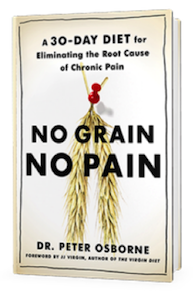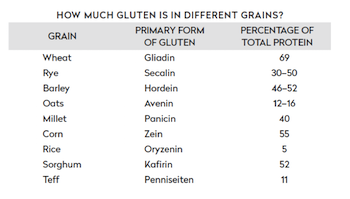
In the tradition of Wheat Belly and Grain Brain, this new book No Grain, No Pain by Dr. Peter Osborne demonstrates the proven link between a gluten-heavy diet and chronic pain and discomfort and offers a groundbreaking, 30-day, grain-free diet plan to help you heal yourself from the inside out.
Dr. Peter Osborne, the leading authority on gluten sensitivity and food allergies (and one of the favorite speakers on The Anxiety Summit), shows how grains wreak havoc on the body by causing tissue inflammation, creating vitamin and/or mineral deficiencies, and triggering an autoimmune response that causes the body to attack itself.
I received an advance copy of this new book and read it cover to cover in a few hours. I could NOT put it down! This book is brilliant and everyone with any health issue, including anxiety and mood problems needs to read it, even if physical pain is not an issue!
As promised, here is the audio interview:
Audio PlayerAnd here are some snippets from this great book:
- The true definition of gluten is that it is a large family of storage proteins found in all forms of grain, including rice, corn, and many others. The bottom line is this: the majority of gluten-sensitive people who eliminate only wheat, barley, rye, and oats but continue to consume other grains don’t get better!
- only one protein, gliadin, found in wheat, barley, and rye, has been extensively studied. Each grain has one or more types of gluten proteins. A recent study identified four hundred new forms of gluten, forty of which were more damaging than the form of gluten for which doctors most commonly test
- Research shows that corn (and corn oil) also produces numerous intestinal and health problems for the gluten sensitive
Here is a great table from the book showing the primary form of gluten and how much gluten is found in different grains:

We covered the fascinating topic of leaky brain on our interview and Dr. Osborne covers it in great detail in the book. Here is a snippet from the book:
Now that you are familiar with leaky gut and understand the interconnected relationship of your brain and your GI tract, let me introduce the concept of leaky brain. Research on gluten sensitivity has identified this syndrome and revealed a connection between gluten-induced leaky gut and leaky brain, confirming the far-reaching effects of gluten on many diseases. Leaky brain means that the blood-brain barrier is breached, just as the gut walls can be breached by damage inflicted by grain. The blood-brain barrier is designed to keep toxic compounds out of the brain’s blood supply, so its disruption could lead to a battery of different neurological and mental symptoms. In addition to schizophrenia, gluten-induced damage can create other neurological problems, including depression, bipolar disease, seizure disorders (epilepsy), facial palsies such as Bell’s palsy, ADD/ADHD, and autism and others [like anxiety – this is my addition]. You could be gluten sensitive and have leaky brain syndrome.
Details about the book and bonus (Leaky Gut Solutions Guide) here
Enjoy!
I want to thank you both for sharing such valuable information. My son is 9 and has had IBS for the last 4 years. We had him tested through the traditional methods and all the results were -ve. We decided to have him pass the Igg for 300 foods and then we started to eliminate many foods. He did well at first but is now starting to show more symptoms. Is it possible that his gut biome has changed and I need to retest? It’s so expensive as you know…but I will do anything for my son. Pls let me know your thoughts. Thanks again!
Audrey, I am by no means an expert on this topic, but I have heard that this happens. People remove foods they are sensitive to and then find new foods they are sensitive to. To this problem Dr. Natasha Campbell-McBride, who created the GAPS program, says to focus on healing the gut (the lining and balancing the microbiome) instead of keeping removing more and more foods. You don’t need to keep retesting. New foods will show up as an issue. Healing the gut itself will get to the root of the food intolerances.
Looking forward to listening to the interview however this makes it quite tricky for those of us who need carbs, if one eliminates all of these, there’s not much left carb wise?
Are Buckwheat, Amaranth and Quinoa included in this list above?
Great question. Would also love to know the answer to this. particularly as I have salicylate/amine issues so cutting out buckwheat amaranth and quinoa and millet would leave me very very hungry indeed. Looking forward to answer.
Amaranth, quinoa, buckwheat and chia are pseudo-grains and still have the same effect: they can cause leaky gut.
You don’t need grains to get enough carbs and feel full and satiated. There are plenty of other foods from which to get carbs, like starchy vegetables and fruits.
Yes, I still eat quinoa….does it also have gluten?
You can get carbohydrates from eating fruits and vegetables. Almost all foods have at least a little, and it takes very little carbohydrate to be healthy, as we can also burn fats and oils for fuel.
Margaret – some of us have to be careful with the intake of fats and oils due to high cholesterol issues as a result of unchangeable genetics. I have the APOE ε3 variant and one copy of the ε4 variant (Genotype: ε3/ε4) so for the likes of us with these variants one has to be very careful with fuel from fats. As soon as I increased my intake of grass fed butter and coconut oil etc, my dangerous cholesterol markers sky rocketed! And so the reason why some of us need fuel from carbs. The new wave of thinking that eating lots of fats is fine is misleading and does not apply to all… We don’t hear much about this in the Functional Medicine/Naturopathic world and I think it needs to be exposed more… It’s all about fat, fat ,fat now – not necessarily so…
Drew – Your “dangerous cholesterol markers sky rocketed!”???
Why are you still worrying about the fundamental misconception of “dangerous cholesterol markers”?
“Nothing applies to all….” of course, but some things, such as “fat, fat, fat” do apply to the overwhelming majority, say >90% of the population.
ε3/ε4 24.0%(European) 34.1%(African American) 15.4%(Asian)
So what?
I have eaten no grains for about 2 years and do not go hungry. Most of my carbs come from starchy vegetables. I live in Hawaii and with each meal eat Okinawan sweet potatoes, taro root prepared various ways, or acorn squash, for example. White potatoes are out because of a sensitivity to nightshades. I adjust the amount of starchy veggies slightly according to my activity level. I also eat 2 servings of fruit each day. It is necessary for me to bring my own starch along when dining out, but other than that, this works just fine.
Didn’t N. Campbell Die?
If you’re asking about Dr. Natasha Campbell-McBride – as far as I know she is alive and well